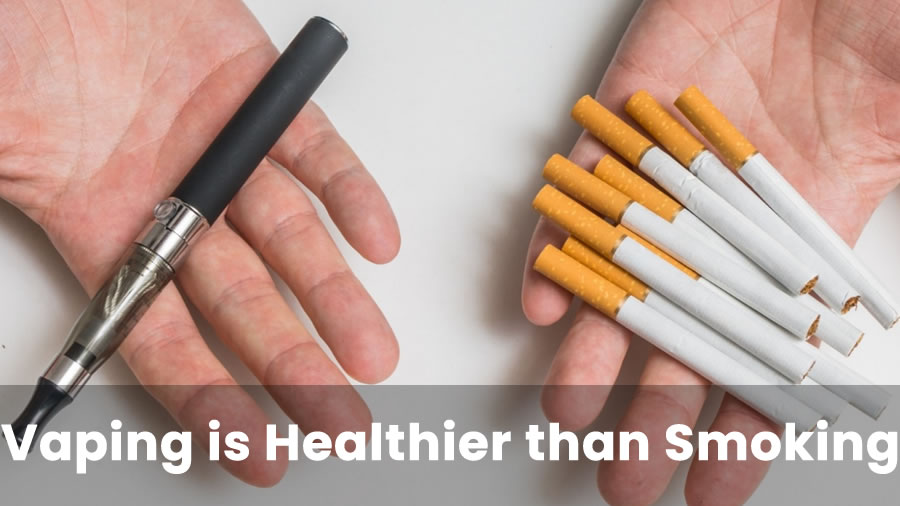
Smoking has been a major public health concern for decades. Smoking causes lung cancer, heart disease, and other serious health problems. In addition, secondhand smoke is also a health hazard for non-smokers. However, in recent years, e-cigarettes or vaping have gained popularity as a possible alternative to smoking. Vaping has been promoted as a healthier option than smoking, but there is still much debate about its safety and potential health risks. In this article, we'll explore the science behind vaping and smoking and why vaping is indeed a healthier option.
Introduction
The Dangers of Smoking
Cigarette smoking is one of the leading causes of preventable death worldwide. Smoking is responsible for lung cancer, heart disease, stroke, and other serious health problems. Cigarettes contain harmful chemicals such as tar, carbon monoxide, and nicotine. These chemicals are inhaled into the lungs, causing damage to the respiratory system and other organs.
The Rise of Vaping
Vaping is a relatively new phenomenon. E-cigarettes were first introduced to the market in 2007, and their popularity has grown rapidly since then. Vaping involves inhaling an aerosol, often called vapor, that is produced by an electronic device. The vapor is created by heating a liquid, usually containing nicotine, propylene glycol, glycerin, and flavorings.
The Debate Around Vaping and Health
The rise of vaping has led to a lot of debate about whether vaping is a healthier alternative to smoking. While some studies suggest that vaping is less harmful than smoking, others raise concerns about the potential health risks of e-cigarettes. In this article, we'll explore the science behind vaping and smoking and why vaping is indeed a healthier option.
The Science of Vaping and Smoking
How Smoking Affects the Body
Cigarettes contain a variety of chemicals that are harmful to the body. These chemicals include tar, carbon monoxide, and nicotine. When a person inhales cigarette smoke, these chemicals are inhaled into the lungs and absorbed into the bloodstream.
Tar is a sticky substance that coats the lungs and damages the air sacs, which can lead to lung cancer and other respiratory diseases. Carbon monoxide is a toxic gas that reduces the amount of oxygen in the bloodstream, which can lead to heart disease and other health problems. Nicotine is an addictive drug that stimulates the release of adrenaline, which can raise blood pressure, heart rate, and cause addiction.
In addition, secondhand smoke is also a health hazard for non-smokers. Secondhand smoke contains the same harmful chemicals as cigarette smoke and can cause lung cancer, heart disease, and other health problems.
How Vaping Affects the Body
E-cigarettes or vaping devices work by heating a liquid that contains nicotine, propylene glycol, glycerin, and flavorings. When the liquid is heated, it produces an aerosol, often called vapor, that is inhaled into the lungs.
While e-cigarettes contain fewer harmful chemicals than cigarettes, they are not completely harmless. E-cigarettes still contain nicotine, which is addictive and can cause health problems. In addition, some e-cigarettes contain flavorings that can be harmful when inhaled.
Comparing Smoking and Vaping
When comparing smoking and vaping, it's important to consider the chemicals in cigarettes and e-cigarettes, the health effects of smoking and vaping, and secondhand smoke and secondhand vapor.
Chemicals in Cigarettes vs. E-cigarettes
Cigarettes contain over 7,000 chemicals, including tar, carbon monoxide, and nicotine. In contrast, e-cigarettes contain fewer chemicals, but they still contain nicotine, propylene glycol, glycerin, and other chemicals.
Health Effects of Smoking vs. Vaping
Smoking is a well-known health hazard and is associated with lung cancer, heart disease, and other serious health problems. In contrast, vaping is a newer phenomenon, and its long-term health effects are not yet fully understood. However, some studies suggest that vaping is less harmful than smoking.
A 2015 report from Public Health England found that e-cigarettes are 95% less harmful than cigarettes. The report concluded that e-cigarettes have the potential to help smokers quit or reduce their smoking, and that they are likely to be much less harmful than cigarettes in the long-term.
However, other studies have raised concerns about the potential health risks of e-cigarettes. A 2019 study published in the American Journal of Preventive Medicine found that e-cigarette use was associated with an increased risk of chronic lung diseases such as asthma, bronchitis, and emphysema.
Secondhand Smoke vs. Secondhand Vapor
Secondhand smoke is a well-known health hazard and is associated with lung cancer, heart disease, and other serious health problems. In contrast, secondhand vapor from e-cigarettes is less well understood. While e-cigarette vapor does contain some chemicals, the levels are much lower than in secondhand smoke.
A 2018 report from the National Academies of Sciences, Engineering, and Medicine concluded that secondhand exposure to e-cigarette aerosol is less harmful than secondhand exposure to cigarette smoke. However, the report noted that there is still a need for more research to fully understand the health effects of secondhand vapor.
The Benefits of Vaping
Health Benefits
While e-cigarettes are not completely risk-free, they do have some potential health benefits when compared to smoking.
Reduction in Harmful Chemicals
E-cigarettes contain fewer harmful chemicals than cigarettes. A 2018 study published in the Annals of Internal Medicine found that e-cigarette aerosol contains significantly fewer toxicants than cigarette smoke.
Reduction in Health Risks
While the long-term health effects of e-cigarettes are not yet fully understood, some studies suggest that e-cigarettes are less harmful than smoking. A 2015 report from Public Health England found that e-cigarettes are 95% less harmful than cigarettes.
Quitting Smoking
E-cigarettes can help smokers quit or reduce their smoking. A 2019 study published in the New England Journal of Medicine found that e-cigarettes were more effective than nicotine-replacement therapy for smoking cessation.
Other Benefits
In addition to potential health benefits, e-cigarettes have other advantages over cigarettes.
Cost-Effective
E-cigarettes can be more cost-effective than cigarettes in the long run. While e-cigarette devices and liquid can be expensive upfront, they can be less expensive than cigarettes over time.
More Convenient
E-cigarettes are more convenient than cigarettes. E-cigarettes do not produce ash or require a lighter, making them more convenient to use in public places.
Variety of Flavors
E-cigarettes come in a wide variety of flavors, making them more appealing to some users. However, some flavors may be harmful when inhaled, so it's important to choose e-liquids that are safe to use.
Conclusion
In conclusion, the science is clear: vaping is indeed a healthier option than smoking. While e-cigarettes are not completely risk-free, they are significantly less harmful than cigarettes. Vaping can reduce exposure to harmful chemicals, decrease health risks, and even help people quit smoking altogether. As we continue to learn more about vaping and its effects, it's important to keep an open mind and consider the potential benefits of this new technology.
FAQs
- Is vaping completely safe?
No, vaping is not completely safe, but it is significantly less harmful than smoking.
- Does vaping cause popcorn lung?
No, vaping does not cause popcorn lung. This misconception came from a study on factory workers who were exposed to high levels of diacetyl, a chemical used to create buttery flavors in some e-cigarettes. However, the levels of diacetyl in e-cigarettes are significantly lower than in the study.
- Is secondhand vapor harmful?
No, secondhand vapor is not harmful. While e-cigarette vapor does contain some chemicals, the levels are much lower than in secondhand smoke.
- Can vaping help me quit smoking?
Yes, vaping can help people quit smoking. E-cigarettes deliver nicotine in a less harmful way than cigarettes, which can help people gradually reduce their dependence on nicotine.
- Are e-cigarettes a gateway to smoking?
No, there is no evidence to suggest that e-cigarettes are a gateway to smoking. In fact, studies have shown that e-cigarettes are more often used by current or former smokers as a way to reduce or quit smoking.







